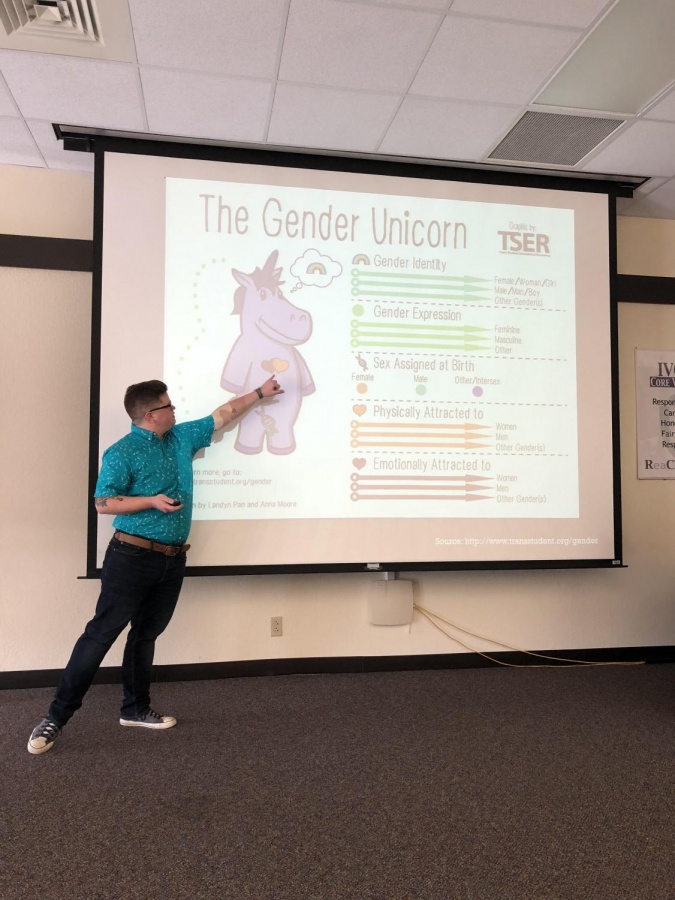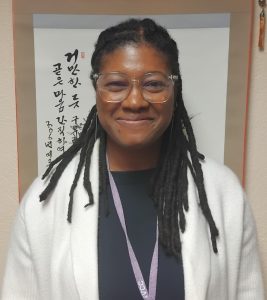We are T: Defining transgender
Talking terms Aiden Ethington explains the differences between gender identity and expression, sex, sexual and romantic attraction.
November 30, 2017
Gender and sexuality issues are complicated. I understand many people get sick of hearing “millennial snowflakes” talk about gender and sexuality. I have heard all of the micro-aggressions and backhanded compliments. LGBT* (The asterisk is used to include all other words not represented by the L, G, B or T) is thrown around as the accepted term to describe lesbian, gay, bisexual and transgender individuals. This is weird; the LGB is sexuality, or who an individual is romantic and sexually attracted too, and the T, transgender/transsexual, is about gender identity and expression. Today, let’s separate out that T and talk about it!
Here’s a few terms to get started. Transgender: an individual whose biological sex assigned at birth does not match their gender identity or expression. Transsexual: it really means almost the same thing as transgender. Many people view it as an outdated term, but many people also use it about themselves. It is often used by individuals interested in or currently going though reassignment surgeries. Cis-gender: an individual whose sex assigned at birth does match their gender expression or identity. Gender identity is how an individual defines themselves, and gender expression is how someone chooses, day by day, to dress, talk, walk, act, etc. Non-binary: someone who is not female or male but rather falls somewhere on the gender spectrum or maybe doesn’t even use gendered words to describe themselves. Queer is currently a reclaimed word and applies to anyone who feels as though they are “other” than what they were once told to be and different than the majority in the straight, cis-gender world.
If you have never felt a mismatch of your sex and gender you likely will not understand just how personal and complicated this gender journey is.
On Oct. 30, Aiden Ethington spoke on campus about their personal gender journey. Aiden uses gender-neutral pronouns (they, them) and has discovered the term demi-guy best describes themself. Aiden went to school at IVCC in the past and currently uses their story to educate others on T issues.
Aiden spoke about their personal journey: family members being supportive and unsupportive, legal name changes and beginning hormones they were able to receive through Planned Parenthood. One thing that really stood out to me was how their sister calls them “broster,” a combination of brother and sister, and their nieces have combined aunt and uncle into “ankle” and even got them a shirt that says “World’s Coolest Ankle.”
Another huge topic that Aiden covered and needs to be stressed over and over again is how to be a T ally. This list of 11 things was found in an article written by Bustle, a women’s online magazine, and was compiled by T individuals themselves.
1. Never out anybody. This can happen accidentally, so be aware of your words while talking to and about someone who is T.
2. Know your terms. There are so many, and I understand it’s very complicated, convoluted and overwhelming, but just try to understand people choose their own terms because they feel comfortable and understood by using them. Validate them as a human being, use the words they prefer.
3. Ask about preferred pronouns and use them! If someone uses they/them, use those pronouns! I don’t care if you think it’s grammatically incorrect: in fact, The Associated Press just confirmed singular use of “they/them” for T and non-binary individuals this year. Again, it is validation and respect.
4. Know what is offensive. Micro-aggressions, outdated terms, outdated Diagnostic and Statistical Manual of Mental Disorders definitions, too personal questions, etc.
5. Realize it can be painful. It is really hard to be in a constant war with your body, mind and mental health.
6. Don’t make assumptions. Do not assume someone’s story is similar to someone else’s. We are all unique, and this still applies within the T community.
7. Listen. Just sit and listen to what someone has to say—you might even learn something new. Listen to activists like Aiden and listen to celebrities like Laverne Cox and Laura Jane Grace.
8. Fight with sensitivity. Do not be a bystander. Use your privilege to help the T community, but let their voices be heard louder than yours, too.
9. Keep curiosity to yourself. When is the last time you asked a random stranger about their genitalia? I’m willing to bet you haven’t unless you have also recently been convicted of sexual harassment. So do not ask a T individual about theirs, and that includes talk of surgery, hormones, and body/gender dysmorphia.
10. ‘Gender doesn’t matter to me:’ do not say it! This falls in the same camp as someone with white privilege saying they are color blind when talking to a person of color. It’s a micro-aggression at the very least and harassment if it persists. Validating someone’s T identity can save their life, seriously.
11. Get political. Vote! Campaign for candidates who run on platforms of LGBT* and T rights. Sign petitions for change. Democrats are historically pro human rights and pro-LGBT*. IVCC has a group right here on campus that you can get involved with: College Democrats. Send me an email to be added to our mailing list.
Most of all, just educate yourself. Do your own research, take a sociology class, and use your voice to help others. Challenge yourself to see the world from a different perspective, be intersectional, be inclusive, and stand up for the minority. After all, you do not have to agree with someone’s life choice to respect them and demand they receive the same rights as you. Think about healthcare, the right just to use a bathroom in public, and the right to pursue happiness.
If you read this article and are suspecting that another cis-gender individual is writing about T issues, you would be mistaken. So here’s to my coming out: I’m not ready to accept “transgender” just yet, but I am 100 percent sure I no longer fall into the cis-gender category and more in the “assigned female at birth and figuring out the rest as I go.” I will join those who reclaim queer as both part of my gender identity and my sexuality. Here’s the best part: my gender and my sexuality are mine to define, and so are yours!




